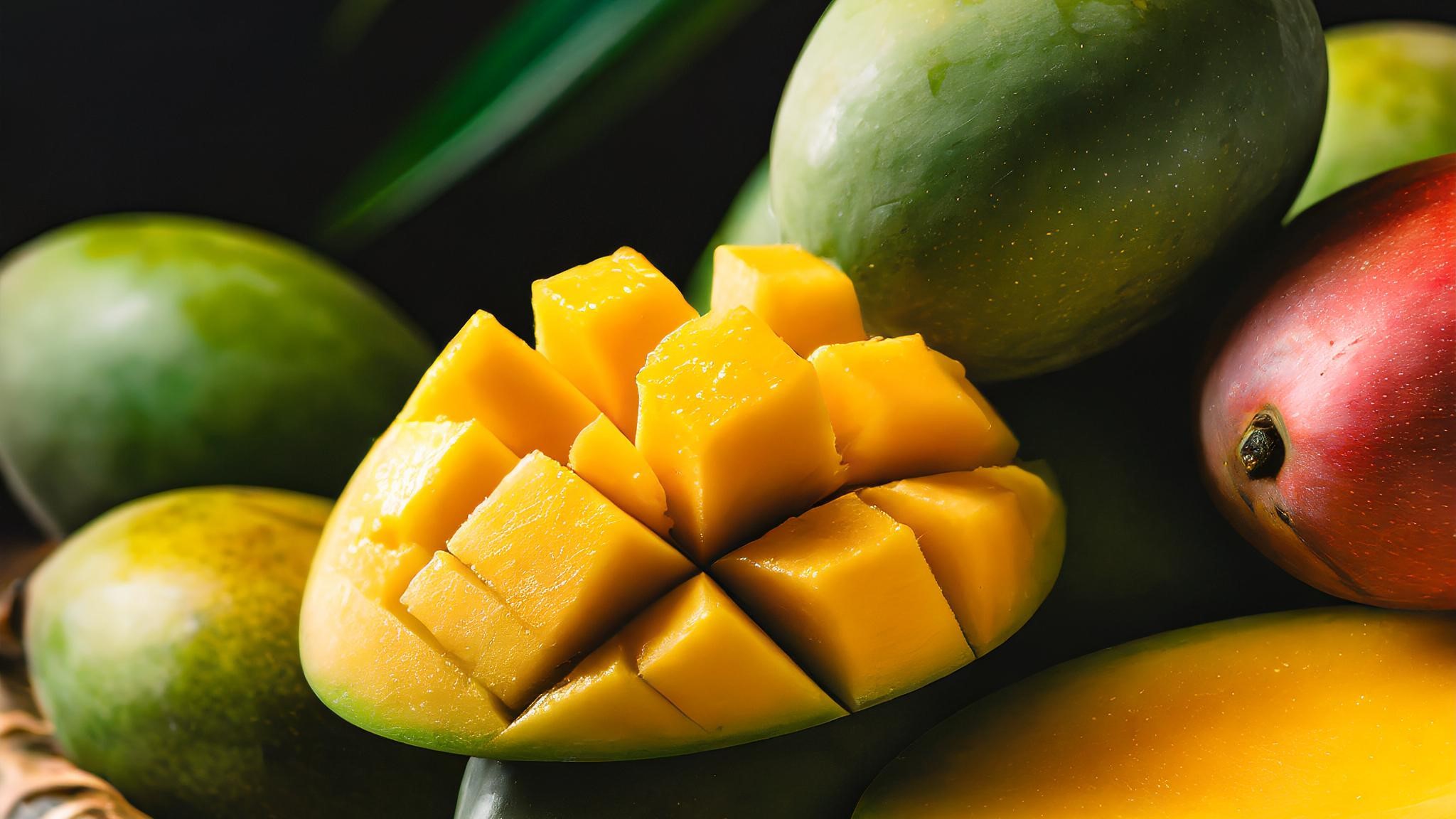In the growing universe of tropical goods, the debate between ripe and unripe mangoes is heating up, leaving many wondering which is the more nutritious choice. It tells the story of two unmistakable phases in the existence of this lovely common, each with its own surprising features and imaginable beneficial benefits. Both raw (ripe) mangoes and ripe mangoes offer health benefits but differ slightly in their nutritional value and potential health effects. Here is a comparison of the health benefits of raw and ripe mangoes:
Nutritional value:
Raw Mango |
Ripe mango |
| Calories: 60 kcal | Calories: 74 kcal |
| Carbohydrates: 15 grams | Carbohydrates: 16.9 grams |
| Fiber: 1.6 grams | Fiber: 2.0 grams |
| Protein: 0, 8 grams | Protein: 0.6 grams |
| Fat: less than 0.4 grams | Fat: less than 0 grams. |
| Sugars: 13grams | Sugars: 14grams |
| Vitamin C: High | Vitamin C: Moderate |
| Vitamin A: Moderate | Vitamin A: High |
| Vitamin A & K: Low | Vitamin A & K: Low |
Key Differences:
Sugars:
Ripe mangoes contain more sugar than raw mangoes, which contributes to their sweeter taste.
Water contains:
Unripe mangoes have a significantly lower water content of 23.5%, while ripe mangoes have a significantly higher water content of 82.9%.
Nutrient:
Raw mangoes are plentiful in L-ascorbic acid, while unripe mangoes are plentiful in vitamin A.
Identifying the health benefits of ripe mangoes:
Wealthy in cancer prevention agents:
They are brimming with beta-carotene and other phytonutrients. Cell reinforcements assist with killing hurtful free revolutionaries in the body, decreasing oxidative pressure and diminishing the gamble of persistent illnesses.
Advances eye wellbeing:
Ready mangoes contain beta-carotene, a forerunner of vitamin A, which is significant for eye wellbeing. Beta-carotene keeps up with sound vision, safeguards against age-related macular degeneration, and supports the retinal capability
Provides energy:
are natural sources of sugars, mainly glucose, fructose, and sucrose, which provide a quick source of energy. They are a sound option in contrast to refined sugars and can assist with recharging glycogen stores during actual work.
Understanding the health benefits of raw (ripe) mango:
Supports digestion:
 Raw mango is rich in fiber, which promotes healthy and regular digestion.
Raw mango is rich in fiber, which promotes healthy and regular digestion.
They are a sound option in contrast to refined sugars and can assist with recharging glycogen stores during actual work
Lowers cholesterol:
Raw mango contains pectin, a type of soluble fiber that helps lower cholesterol by binding to cholesterol in the digestive tract and promoting its excretion. Standard utilization of crude mangoes can assist with bringing down LDL (terrible) cholesterol levels and further develop heart wellbeing.
Help with weight control:
They are low in calories and sugar, making them a good choice for those watching their weight. The high fiber content of raw mango helps increase satiety and decrease calorie intake, which supports weight management efforts.
Maintains Resistance:
Contains L-ascorbic disastrous, yet in extra honest aggregates than organized mangoes, which helps support the protected structure and shield against degradations. Adding crude mangoes to your eating regimen can assist with helping your insusceptible framework and diminish your gamble of illness.
Ripe Mangoes Pros and Cons:
Pros:
Sweet and Fulfilling:
Ready mangoes are normally sweet and can fulfill pastry or nibble desires, which can decrease desire for less sound desserts.
Nutrient-rich:
They are rich in vitamins, minerals, and antioxidants that provide essential nutrients and support overall health.
Energy Boost:
 Ripe mangoes contain natural sugars that provide a quick source of energy that can be useful as a pre-workout snack or to boost energy levels.
Ripe mangoes contain natural sugars that provide a quick source of energy that can be useful as a pre-workout snack or to boost energy levels.
Cons:
More calories:
Ripe mangoes tend to contain more calories and sugars than raw mangoes, which can increase calorie intake if consumed in excess.
Risk of Overconsumption:
The sweet taste of ready mangoes can prompt gorging, particularly when consumed in huge amounts.
High Sugar Content Contains:-
Due to the high glycemic index and high simple sugar, ripe mangoes should be consumed in limited quantities, especially by diabetics.
Raw Mango Pros and Cons:
Pros:
Low-Calorie Mango:
A raw mango contains fewer calories and sugars than a ripe mango, making it a good choice for those watching their calorie intake.
High in fiber:
They are high in fiber, which helps you feel full and helps you lose weight by reducing your calorie intake.
Light taste:
 The bitterness of raw mangoes can help satisfy cravings for a sour or bitter taste without the added sugars found in processed snacks.
The bitterness of raw mangoes can help satisfy cravings for a sour or bitter taste without the added sugars found in processed snacks.
Cons:
Taste Preferences:
The raw mango pie test may not be to everyone's taste, making it less enjoyable for some people.
Some myths and facts about raw and ripe mangoes:
Myth: Ripe mangoes are rich in sugar and are not suitable for diabetics.
Fact: While ripe mangoes contain natural sugars, they are also a good source of fiber, vitamins, and antioxidants. Ripe mangoes, whenever consumed as a feature of a reasonable eating regimen, can be delighted under the direction of a diabetic nutritionist.
Myth: Ripe mangoes add weight.
Fact: Like any food, eating such a large number of ready mangoes can cause weight gain due to their calorie content. Be that as it may, when eaten with some restraint as a component of a decent eating regimen, ready mangoes can be remembered for an eating regimen or weight-the-board plan.
Myth: Ripe mangoes are bad for digestion.
Fact: Ripe mangoes are really great for assimilation due to their high fiber content. Fiber advances customary gut capability and supports a sound stomach-related framework.
Myth: Raw mangoes are too sour to eat.
Fact: Although raw mangoes have a sour taste, they are often used in various cuisines around the world to add flavor to dishes. Raw mango is suitable for salads, chutneys, pickles, and other delicious preparations.
Myth: Raw mangoes are not nutritious.
Fact: Raw mangoes are packed with nutrients like vitamin C, vitamin A, fiber, and antioxidants. They offer health benefits such as immune, digestive, and heart health.
Myth: Raw mangoes are bad for health.
Fact: Crude mangoes are protected to eat and are consumed in many societies all over the planet. Be that as it may, certain individuals might encounter an unfavorably susceptible response or heartburn in the event that they consume a lot of crude mango or on the other hand on the off chance that they are delicate to specific mixtures in the natural product.
Conclusion:
Depending on personal preference and overall nutritional goals, both ripe and raw mangoes can be included in a weight loss diet. Ripe mangoes are sweet and satisfying but should be consumed in moderation due to their higher calorie and sugar content. Raw mangoes instead.
